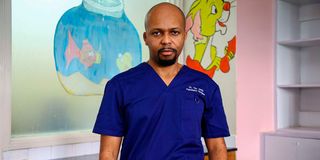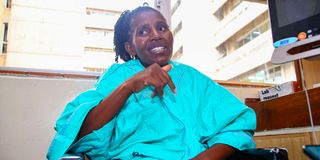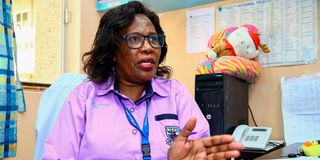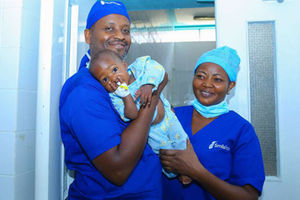
Ms Ruth Kariuki holds her baby who underwent corrective surgery for an anorectal malformation at Kenyatta National Hospital in Nairobi on May 13, 2025.
Ruth Kariuki paces from one side of the hospital corridor, trying to calm her baby Favour Gatwiri. Her worried gaze remains fixed on the baby’s face as she tries to lull her. With each step that she takes, she hopes that Favour will stop letting out that shrill cry of pain. She is only five months old and is in hospital for a surgery that will help in restoring his ability to poop normally.
We are at the paediatric (children’s) unit of the Kenyatta National Hospital. The paediatric surgeon, Dr Tim Jumbi, is doing his ward rounds, tagging along with medical registrars. In the ward are women whose babies were born with Anorectal Malformation –which he explains to Nation is a disorder of the anus and the rectum and a patient mostly presents with the absence of an anal open.

Dr Tim Jumbi, a paediatric surgeon at Kenyatta National Hospital in Nairobi.
In the digestive system, the rectum and the anus are located at the tail end of the large intestines, and it is the anus that allows faecal matter to be excreted from the body. The rectum only stores the faeces temporarily before it is let out.
When Favour was born five months ago, her mother, Ruth, noticed an anomaly but she was not sure if it’s a medical condition that warrants urgent attention.
“When the doctor officially handed over the baby to me on the day that she was born, he informed me that she had a cleft lip. I was later transferred to a different section of the hospital, and for two weeks, no one noticed that my baby was not okay,” she says.
“I noticed that when it was time to poop, she would do that from the vaginal area and not the anus. When I saw that, I was shocked and was afraid of asking the doctor what that could be,” she tells Nation.
Ruth eventually left the hospital without informing the medics.
“I was in distress,” she tells Nation.
At home, she did not tell her husband immediately about the condition of their child. It is only after two months that she opened up to Favour’s dad, who was receptive and supportive. He asked her to go to the clinic to seek clarity on what the problem could be.
“The doctor told me that my baby’s condition wasn’t normal. We were referred to KNH, and when we got there, Favour was admitted and was advised that she needed surgery,” she says.
Before her child was born, she used to sell clothes in Eastleigh, but she couldn’t juggle business and take care of her sick newborn. It has been six months since she had her first surgery, and when we visited her at the Kenyatta National Hospital, Favour was due for a second surgery later that day.
“It has been tough. When I came here this week, I felt comforted. I thought that I was the only woman whose child has this condition. I met so many women whose children are like mine. We talk and feel at peace,” she says.
She is not alone. When Tabitha Wanjiru gave birth to her son Immanuel Paul about nine years ago, she realised he had an issue when she noticed that his stomach was swollen. Two doctors did not notice the condition at first, it is the third that pointed out that he has a condition.

Ms Tabitha Wanjiru whose baby had an anorectal malformation and underwent corrective surgery at Kenyatta National Hospital in Nairobi on May 13, 2025.
Just like Favour, Immanuel had his first surgery and has never sought medical help for nine years.
“I did not have money to take him to hospital. I wash people’s clothes to earn a living. I could only raise money for diapers that I tied him around the stomach,” she says.
When Immanuel was old enough to go to school, he was turned away from the first school that she went to.
“The teachers told me that he smells, and people wouldn’t be comfortable around her. I got the same reception when I went to second school. In the third school, a doctor wrote a letter, and he was finally accepted,” he says.
Immanuel’s father left Tabitha when she learnt that his child could not poop like normal people do.
“I have been sidelined because of my child, but I also get blessings because of him. People have said mean things to me. Someone even told me that my child would die because of the condition, but I am proud of him, I have never hid him in my house. He is loved at home,” Tabitha tells Nation.
“My child always feels bad when his fellow students start poking at him, but he remains relentless. He has told me that one day he will be a doctor, so that he can help people,” she adds.
When she took her child to be washed recently, someone told her that there was a medical camp at KNH so she was emboldened to come to the hospital for his treatment.
“He had his surgery yesterday. And he is happy. He is smiling and hopeful. I encourage all mothers to always speak up, and seek help,” she says.
Dr Jumbi explains to Nation that ideally, diagnosis for Anorectal Malformation should be made at birth. Sometimes, though, this diagnosis is missed. It is a congenital disorder, meaning that people are born with it and it may have connections in the urinary tract and the genital tract.
“If you don't examine the anal opening, then you can miss it. Sometimes you examine it and you find that the anal opening is present, but it is abnormal in location, or position,” he explains.
When this diagnosis is missed in a hospital setting, the onus is on the caregivers or the mothers to check and ensure that their baby poops correctly.
He says that checking whether a baby has passed a meconium –the first stool they ever excrete, then they are likely to have the condition.
Another way to check whether one’s child has this condition is when they have a big abdomen.
“That means the abdomen will be distended. So, stool and gas is being formed, but it can't come out. The children usually get very sick,” he explains.
Dr Jumbi explains that girls will likely go home undetected more than boys because they may not present with a big abdomen despite having an abnormal passage of their stool and gas.
“There's something called a fistula. It is an abnormal connection between the rectum and any other part of the body. In girls, there might be a connection between the anus and somewhere around the vaginal area called the vestibule. And stool might come out from that area,” he explains, shedding more light on why baby Favour’s stool had an abnormal passage.
Boys, too, have fistula but Dr Jumbi says that it is only to the urinary tract. Medically, this is referred to as the renal urethral fistula. In boys, the urethra is a small tube that connects the bladder to the outside world, they pee through it.
“In some of these boys, they will be passing meconium (first stool) through the penis. You see a small baby farting through the penis,” he says.
There are three ways to treat this condition. Dr Jumbi explains using the analogy of a road that is under construction.
The first bit is the diversion of the colostomy which is usually done at the point of diagnosis. In a road construction set up, when there is a new road coming up, the engineers will create a temporary diversion for motorists to still find a way. This is what happens during an actual diversion of the colostomy.
After sometime, in the second stage now which usually takes about three months, there is reconstruction but this depends on the child’s health stability or any associated anomalies. When everything is okay now and an opening has been created in the anus, a child will be given time to heal.
In the third stage –closure of the colostomy, the first opening that had been made is now closed, just like a road diversion which is removed to let motorists use the road with ease.
About 45 children have been screened and thirty of those scheduled for the Anorectal malformation surgery.
"We would want the general public to know that there are children living with these conditions. It is important that the community should not alienate them. It is important for the community to embrace them and to offer help," he says.
Rose Njoroge, a Counselling Psychologist, and Registered Nurse at KNH says that families need psychological support when they get babies who have such conditions.

Rose Njoroge, a counselling psychologist at her office at Kenyatta National Hospital in Nairobi on May 13, 2025.
“When a mother gives birth, they are never prepared to get a child with any condition. It mostly comes as a shock, because every mother wants to give birth and go home to celebrate their new born,” she says.
“Initially, there is a lot of anxiety, a lot of fear, and questions. But when they arrive here, we stabilise them, and prepare them psychologically before their children go to theatre,” she adds.
Most people face stigma because, despite this being a common condition, there is a general lack of knowledge yet this is a condition that is reversible.
“We advocate for family conferences, where we educate both parents and sometimes the extended family on the condition and how they should take care of the child,” she explains.
“The greatest thing fathers can do is to support their wife when they have such a child,” she adds.
In a study that Rose co-authored with her colleagues published in the International Academic Journal of Health Medicine and Nursing, she says that such conditions come with a lot of psychological torture and stigma from the community.
“It is wrong for teachers not to accept students because of a medical condition. It is even illegal. When the children come here, we restore their hope. Every child has a right to medication and medical care,” he says.





